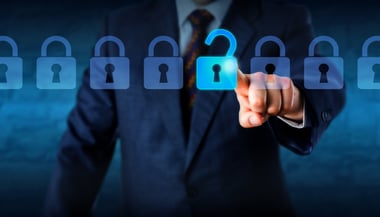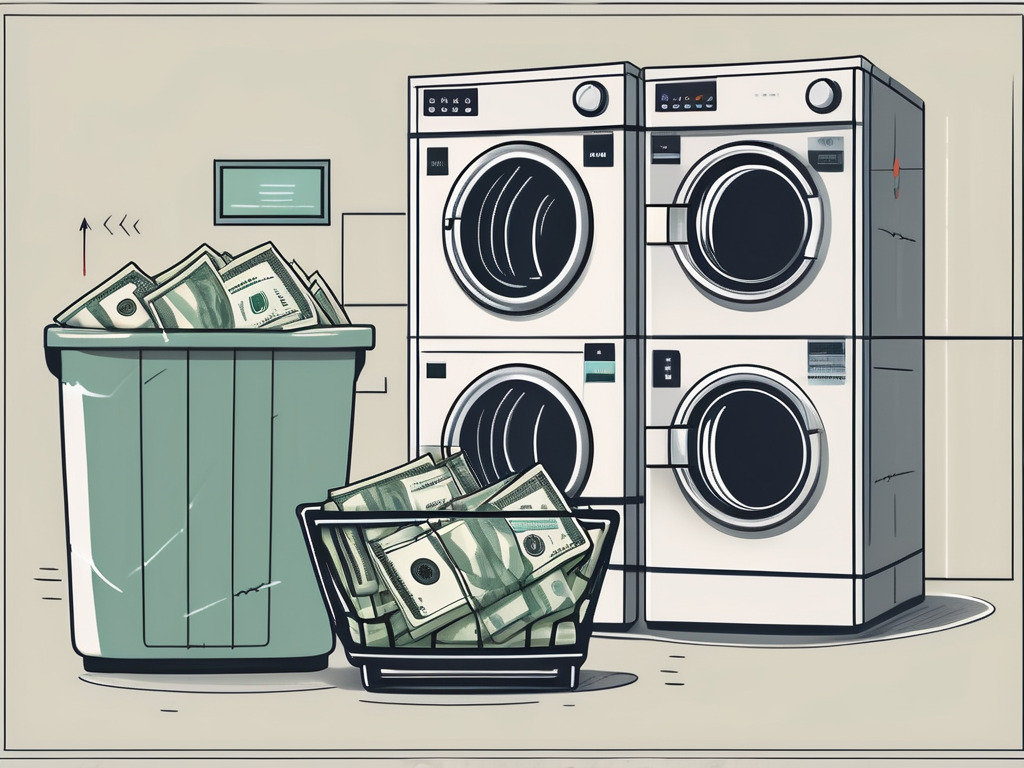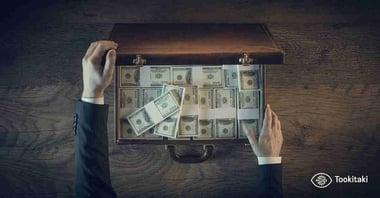Money laundering, in simple terms, is the process where illegal money is made to look legal. Criminals use various techniques to hide where their ill-gotten gains come from, making it difficult for authorities to trace its origins. By doing so, what exactly is money laundering becomes a bit clearer: it's a method of disguising the illegal origins of money.
How does Money Laundering work?
Money laundering is a complex process, but here's a basic idea of how it works. Criminals often obtain money from illegal activities, like drug trafficking or fraud. They then use several techniques to make this "dirty money" appear "clean." These can range from simple methods like using a front company in money laundering to more complicated ones, like trade-based money laundering or using shell companies.
Stages in Money Laundering
Every money laundering operation typically follows a series of steps. Understanding these stages helps authorities, businesses, and individuals to identify and prevent such illicit activities.
- Placement: At this stage, the 'dirty money' from criminal activities is first introduced into the financial system. This might be done through methods like bank deposits.
- Layering: This is where things get complex. The money launderer might use a myriad of transactions to confuse and cloud the money's origin. This could involve multiple bank transfers, withdrawals, or even using the money to buy and sell assets.
- Integration: This is the final stage where the now 'cleaned' money is integrated into the legitimate economy, making it hard to distinguish from legally-gained funds.
Money Laundering in a Digital Era
In today's world, technology is growing at an astonishing pace, and with it, criminals are finding new, sophisticated ways to hide their illegal earnings. Many of today's popular digital tools and platforms, which we use for everyday tasks, are becoming tools for these money launderers.
Cryptocurrencies, like Bitcoin and Ethereum, are a prime example. These digital coins, designed to keep transactions private and decentralized, are increasingly being used by criminals for money laundering activities. As more people start using and trading cryptocurrencies, there's a spike in cybercrimes related to them, making it crucial for us to understand and monitor these new laundering methods.
Learn More: Digital Era Money Laundering Techniques
Money Laundering is an Illegal Financial Crime
Money laundering isn't just unethical; it's illegal. But why is money laundering considered a crime? For starters, money laundering supports criminal enterprises, like drug trafficking or terrorist activities. This means that by laundering money, one indirectly supports these illicit activities. Moreover, it disrupts the economy, causing financial instability. People launder money to evade taxes, leading to a loss of government revenues. When illegal funds enter the economy disguised as legal money, they can influence genuine businesses, leading to unfair competition.
Moreover, money laundering is what type of crime? It's a financial crime that can lead to hefty penalties for money laundering, including prison time.
Businesses at a High Risk of Money Laundering
Some businesses are like magnets for money laundering because of the nature of their transactions. Let's break it down:
- Banks: Think of banks as big money hubs. Lots of money moves in and out every day. Because of this, it's sometimes easy for shady characters to slip their bad money in, hoping it blends in with the rest.
- Casinos: Imagine walking into a place where everyone's playing games with heaps of money. Criminals can use their dirty money to buy chips, play a few games, and then cash out, making their money seem like honest winnings.
- Real Estate: This is like a giant Monopoly game for some criminals. They use their illegal money to buy properties. Once they sell these properties, the money they get back appears clean, as if it came from a regular property sale.
- Car Dealerships: Here's a trick: Some people buy fancy, expensive cars using their bad money. Later, they sell these cars and act like the money they get is from a regular sale, cleaning up their illegal funds in the process.
- Art Dealers: Art can be worth a lot of money. Criminals sometimes buy pricey art pieces with their dirty cash. After some time, they sell this art, and the money they earn seems like it's just from a regular art sale, hiding its shady origins.
Why to Prevent Money Laundering?
Preventing money laundering is like taking a vaccine for the economy; it keeps it healthy and running smoothly. If you think of an economy as a big, complex machine, money laundering throws sand in the gears. When criminals wash their dirty money through the system, it can confuse and mislead honest businesses. They might see a false picture of the market and make bad decisions based on that.
Moreover, just like how taxes help governments provide public services, unchecked money laundering robs them of funds that could be used for good. Instead, this money might end up supporting dangerous activities or groups. Imagine a playground funded by taxes, but because of money laundering, there's less money for swings and slides. This is why stopping money laundering is not just about obeying the law; it's about ensuring a fair and prosperous community for everyone.
Combating Money Laundering
Battling money laundering is like a team sport where everyone - governments, banks, and businesses - has to play their part. Just like how in a soccer game each player has a role, from the goalkeeper to the forward, in this "anti-money laundering" game, each player's role is vital. Governments act like the coaches, setting the rules and guidelines by passing laws. They expect everyone to follow these rules, which are essentially game plans to stop the dirty money flow.
On the other hand, businesses and banks are like the players on the field. They have the primary responsibility to act according to these laws. This means, if a bank or shop sees someone suspicious or if a person is making really big transactions without a clear reason, they need to raise a flag. It's like when a player sees someone breaking the game's rules and alerts the referee. By keeping records, checking who they're doing business with, and telling the authorities about anything fishy, businesses and banks are the frontline defenders in this crucial match against financial crime.
How can Tookitaki help your business?
Tookitaki has emerged as a leading provider of AML compliance solutions, catering to a diverse range of financial institutions, including banks and fintech enterprises such as digital banks, e-wallet providers, lending firms, and payment companies. From its inception, our company has been dedicated to revolutionizing the fight against financial crime by revolutionizing conventional, isolated AML methods. We've achieved this through our groundbreaking Anti-Money Laundering Suite (AML Suite) and the collaborative Anti-Financial Crime (AFC) Ecosystem.
Our Anti-Money Laundering Suite (AMLS) stands as a comprehensive end-to-end operating system designed to modernize compliance procedures for both traditional banks and cutting-edge fintech firms. It offers extensive risk coverage, elevates the accuracy of detection, and notably reduces the occurrence of false alerts. Complementing this suite is our AFC Ecosystem, a collective of experts committed to unveiling concealed financial irregularities that conventional methods often overlook. Powered by federated machine learning, our AMLS collaborates closely with the AFC Ecosystem, ensuring that financial institutions remain at the forefront of their AML efforts.
Our distinctive community-centric approach empowers financial entities to efficiently identify, prevent, and combat money laundering and associated criminal activities, thus fostering the development of sustainable AML programs.
Final Thoughts
Money laundering is not just a term thrown around in crime dramas; it's a real-world issue with tangible consequences for economies, businesses, and societies at large. By understanding what money laundering is, how it operates, and its potential impact, individuals and businesses are better equipped to detect and prevent such illicit activities. Vigilance, awareness, and utilizing advanced solutions like Tookitaki are essential in the global effort to combat this financial crime. As we move further into the digital era, staying informed and proactive is the key to safeguarding our financial systems and ensuring they remain transparent and trustworthy.
Frequently Asked Questions (FAQs)
What is a shell company in money laundering?
A shell company, in terms of money laundering, is a business that exists only on paper. It's used to make illicit funds appear legitimate. This money laundering technique hides the real source of funds, making it harder for authorities to trace.
What is the basic objective of money laundering?
The primary goal of money laundering is to make illegally-gained proceeds appear legal. Essentially, it's about "cleaning" dirty money to hide its origins.
What is the penalty for money laundering?
The penalty for money laundering varies by jurisdiction, but it often includes hefty fines and long prison sentences. Some countries have specific laws that can lead to decades in prison, especially if the laundering supported terrorist activities.
What is trade-based money laundering?
Trade-based laundering involves manipulating trade transactions to disguise the illicit origins of money. This can be done by over-invoicing, under-invoicing, multiple invoicing, or falsely describing goods or services.
What is a front company in money laundering?
A front company operates legally in the public eye, but its primary purpose is to wash money for illicit activities. Such businesses might appear legitimate but are used as a facade to legitimize illegal funds.
What amount is considered money laundering?
The amount that's considered money laundering can vary. In some places, any amount laundered is illegal, while other jurisdictions might have specific thresholds.
Anti-Financial Crime Compliance with Tookitaki?



